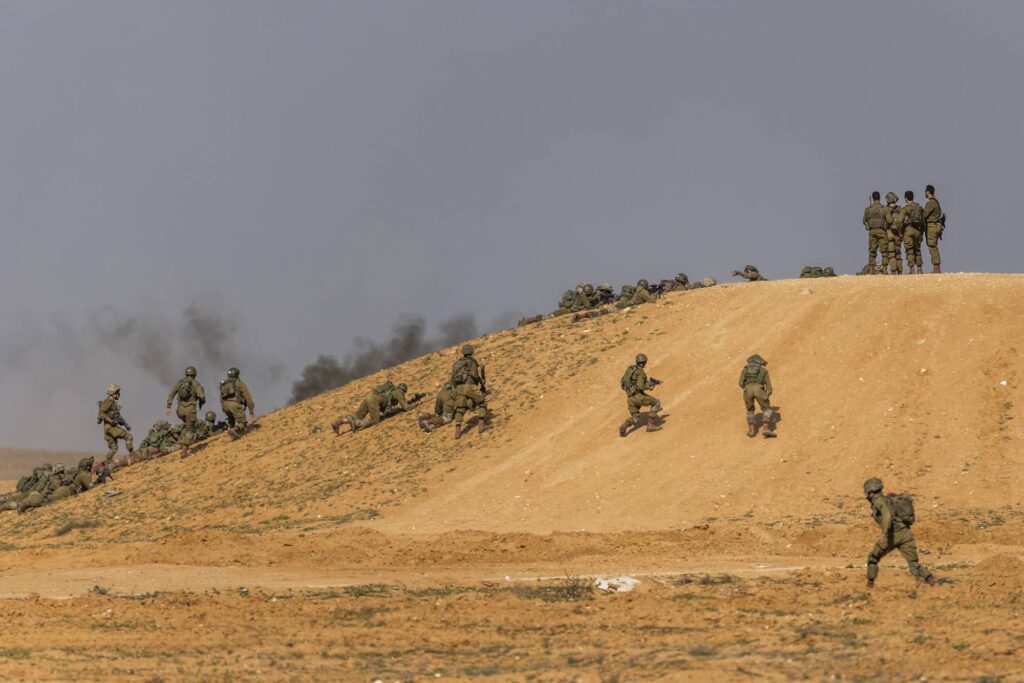“No one starts a war–or rather, no one in his senses ought to do so–without first being clear in his mind what he intends to achieve by that war and how he intends to conduct it.” While The famous Prussian military theorist Carl Von Clausewitz penned that strategic wisdom in the 19th century, those words are as valid today as when they were first written. The topic of how wars end is of utmost importance and in an ideal situation, all operations should be aimed towards shaping a post-conflict environment that puts oneself in a better situation than when the conflict began.
Four months into the war with Hamas, Prime Minister Benjamin Netanyahu outlined his vision for what Gaza will look like after the conflict. Netanyahu’s plan includes replacing Hamas with a local civilian alternative for administrative control, while requiring the demilitarization and deradicalization of Gaza. Israel would maintain overall security control, with its forces able to come and go as they please.
The Israeli plan creates as many questions as it answers. If Israeli forces don’t establish a permanent presence in Gaza, who will maintain security and law and order? Someone will have to police one of the most densely packed urban areas in the world. To be able to continue the fight to destroy Hamas without endangering support from the US, Israel will need to establish security in Gaza so that it doesn’t look like a failed state teetering on the edge of starvation. Scenes reminiscent of Somalia, with people swarming trucks delivering aid, coupled with disputes over who is responsible for the civilian deaths stemming from such chaos, block achieving that objective.
To avoid such a humanitarian and public relations disaster, Israel will likely have to establish some form of partnership with local security forces in Gaza, an extremely difficult task that requires considerable time, effort and preparation.
The complex and risky task of establishing some form of security partnership with Palestinians will have to occur because Israel will not be able to maintain security in Gaza unilaterally for an extended period. Moreover, there is no other state that is keen to partner unilaterally with Israel and help with such a perilous project. And if it isn’t done effectively, there will be catastrophic effects, undermining the central Israeli war aim to prevent another October 7th and damaging Israel’s relations with its principal ally, the United States.
The Challenge of Going Alone
Who might perform the mission of providing security, not just counterterrorism strikes, to Gaza? Providing security during counterinsurgency operations is a task with heavy manpower demands, as the US came to realize in Iraq and Afghanistan. While there is substantial debate over the correct ratio of security forces to population density necessary to achieve success, estimates from the U.S. Institute for Defense Analysis applied to Gaza result in a requirement that ranges from 42,000 soldiers for a bare minimum chance of victory to 84,000 soldiers for a more than even chance to succeed.
Such an enormous commitment of IDF manpower to just the Gaza theater would be extremely challenging to maintain. The threat of Hizbullah in the north has not receded, where nearly 100,000 Israelis have been displaced from their homes. Considerable forces will be required to deter future terrorist attacks there, and if war breaks out, the manpower demand will be even greater. Israel’s conscript military is dependent on called-up reservists to meet the demands in Gaza and the north, and a long-term commitment of forces is simply not sustainable.
Mobilizing four percent of Israel’s population – or more – for long-term military service is economic suicide, with nearly half of Israelis eligible for military service reporting that they have had to reduce their workdays. Already there has been immense pressure to demobilize called-up reservists, and many have gravitated back to their civilian lives. Yet unfortunately the results of such a drawdown are clear: in north Gaza, organized Hamas fighters are reinfiltrating previously cleared areas because there are insufficient IDF forces to hold the area.
Like the U.S. in Iraq, Israeli military forces have cleared urban areas but not been able to hold them. Therefore, the mobilization of reserves created a Catch-22 for Israel. While it is necessary to maintain security, it is painful and nearly impossible to continue for extended periods, and the Gaza war is already the longest conflict since the 1948 War of Independence.
Hoping that other state actors would step in to help Israel in unilaterally providing security is unrealistic. The United States, European and Arab states are not likely to respond to Israel’s appeals to join in such a dangerous task. Likewise, the United Nations Security Council would not support or garner support to commission a peacekeeping operation, much less obtain member state commitment for troops.
Taking sole responsibility for security in Gaza risks permanently damaging relationships with the US and other allies. The South African accusation of genocide in the International Court of Justice was a preposterous and offensive double standard, but there are many troubling international signs developing. While there is some inconsistency in polls assessing American support, an Associated Press survey from the end of January reveals that more than half of Americans believe Israel has “gone too far.”

A Difficult but Feasible Solution: Local Partners Trained by a US-led Multinational Force
So how can Israel establish and maintain security in Gaza? One option is through local partners. This can take the form of something deceptively simple such as police forces or security guards, without standing up vast military forces like the US did in its post 9/11 wars. At the very least some form of local security forces will be needed to escort supplies, given that if they are not guarded, they will likely be looted.
Even that limited objective would be complex, challenging, and require considerable effort. For example, one lesson from the US experience in Iraq is that if police are not selected, trained, and armed properly, they become part of the problem. Unarmed police are either quickly killed off or refuse to leave their bases. Improperly vetted police are ripe for infiltration, creating so called “green on blue” incidents where they turn their guns on friendly forces.
Recruiting local forces has tremendous advantages. They know the human and geographic terrain better than any outsiders and can often identify threats just by recognizing individuals in a crowd. Local forces speak the language of the people, thereby reducing the possibilities of tragic mistakes where military forces open fire during tense misunderstandings. This reduces the challenge of insurgent math, that for every civilian killed accidentally, ten new insurgents are created. And local forces would also greatly help with another form of math: the deep manpower deficit that Israel will face without a long-term callup of its reserves.
If Israel did conduct some form of partnership in Gaza, it wouldn’t be the first time that the IDF worked with local forces to help provide security. In the past, Israel – unsuccessfully – worked through the powerful families and clans of Gaza to help provide order.
One of the most important ingredients for those effective missions is having capable advisors who consistently partnered with local forces. Building capable local forces requires advisors who are assessed and selected for their compatibility with the mission, and then training those advisors extensively before employing them. While the mission could, theoretically, be carried out by foreign contractors, it is highly unlikely that the security situation in Gaza will be stable enough to outsource it anytime soon; having contractors as advisors could create an additional layer of problems.
Following the Second Intifada (2000-2005), the US created an US-led and internationally-staffed Office of the US Security Coordinator (USSC) to train and professionalize Palestinian security forces in accordance with the Israeli -Palestinian peace agreements, the Oslo Accords. Initially covering both Palestinians in the West Bank and Gaza, after the Hamas coup d’etat in Gaza in 2007, this office focused on creating a Palestinian security force on the West Bank, who are vetted by Israeli and other security services. This USSC model, a US-led and internationally-staffed training mission, has proven resilient and fairly successful despite the political tensions and violence in Israeli-Palestinian relations over the past decades.
Israel does not have sufficient forces to both occupy Gaza and defend against Hizbullah and other threats, without conducting an exceedingly painful long-term call up of reserves. Withdrawing leaves the task of destroying Hamas undone and Israel open to even more attacks, which the terrorist group has openly promised will happen again and again. Letting Gaza remain in chaotic stasis while conducting punitive expeditions risks critically damaging long-term relationships with critical allies. This leaves few options other than having local partners to help maintain security. The US Security Coordinator model should be looked at as a template for training local police.

